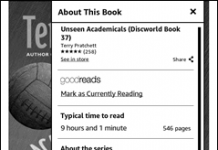 A comment on a story from a couple of weeks ago called my attention to Thomas Hertog, an author who wrote a Kindle book and was so amazed by how easy it was to game the Amazon review and ranking system to shoot to the top of the best-seller lists, he turned around and wrote another book about the process called The Day the Kindle Died.
A comment on a story from a couple of weeks ago called my attention to Thomas Hertog, an author who wrote a Kindle book and was so amazed by how easy it was to game the Amazon review and ranking system to shoot to the top of the best-seller lists, he turned around and wrote another book about the process called The Day the Kindle Died.
The book was ostensibly removed from the Kindle store earlier this month, but it actually still seems to be available for purchase and download after all. EbookNewser corresponded with Hertog, who reported receiving an angry email from Amazon stating that they “will not tolerate” people gaming their system.
Hertog points out that if Amazon wants to prevent their review and ranking system from being gamed, they should start looking in other places than his book. He notes that it is easy to pull up offers for paid book reviews on Google (which is corroborated by this article on AOL’s jobs site) and if Amazon were serious about it, they would start by doing something about these offers.
Hertog defended his book and went on to say: “The Day the Kindle Died exposes Amazon’s flawed sales rankings and customer reviews and is condemned by Amazon. The hypocrisy is palpable when Amazon claims they ‘will not tolerate efforts to manipulate’ their data, but they do nothing to prevent it.”
Speaking of attempts to manipulate sales rank, I see that Phil and Kaja Foglio’s book Agatha H. and the Airship City—which Phil and Kaja had asked readers to purchase simultaneously on 1/12 so as to make it onto best-seller lists—is currently ranked at #986 overall, #28 in Satire, and #58 in Science Fiction & Fantasy. (According to a post on the Girl Genius comic site, the book broke into Amazon’s top 20 on the 12th, peaking at #17.)
I’m sympathetic to both Amazon and Hertog—certainly Amazon doesn’t want people manipulating its sales rank figures, but on the other hand the store could certainly stand to do a better job of preventing it than just banning an e-book about it.
































So much of what I’ve seen Hertog say seems to indicate a fundamental lack of understanding of just what sort of volume the kindle store can move. I’ve met plenty of people who think that sales grow geometrically as ranks improve, because a few sales at the worse ranks can move you up the ladder so quickly. Under the rank of 10,000, though, sales explode. I would not be surprised if the growth was exponential under 1,000.
Plus, until kindle gifting arrived, an author couldn’t game the system by buying multiple copies of their own kindle book without creating multiple accounts. You can’t buy the same kindle book more than once on one account. Since I’ve seen sales of 2,000 copies in 4 days barely crack the top 100, I very much doubt anyone put their book at the top of the list by purchasing multiple copies. (Even kindle gifting is questionable, since the recipient can convert the gift to a gift card and buy something else, so I’m not sure if it’s applied as a sale directly.)
Claiming to have the secret to kindle ranking and then having it taken down (except not taken down?) by Amazon for being TOO REAL seems like an interesting viral marketing strategy to me. My cynical side suspects what he’s actually discovered is the secret to 15 Minutes of Fame.
On the same topic, I found this to be an interesting article based on some actual attempts to find out just what makes the Amazon system tick: http://www.novelrank.com/blog/sales-rank-myths-busted-what-effects-salesrank-changes/